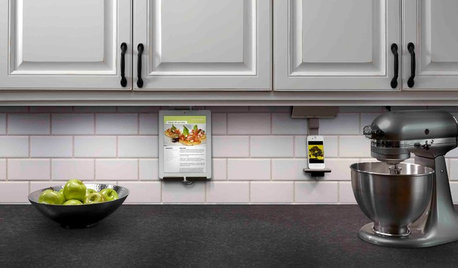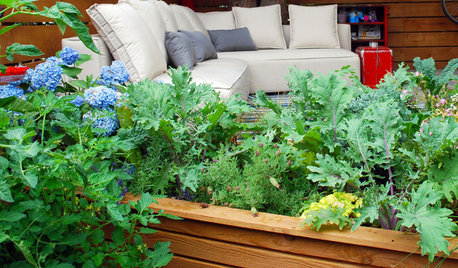Can I safely substitute zucchini for cucumbers in this recipe?
jbmag
13 years ago
Related Stories

KITCHEN DESIGNHouzz Call: What’s Cooking in Your Kitchen?
Most of us turn to recipes, videos and culinary shows when we cook. Where do you set your cookbook, tablet or TV screen?
Full Story
FARM YOUR YARDHow to Grow Vegetables in Containers
Get glorious vegetables and fruits on your patio with a pro’s guidance — including his personal recipe for potting mix
Full Story
PETSPet-Proofing Your Home: A Room-by-Room Guide
Not all pet dangers are obvious. Keep furry friends safe and sound by handling all of these potential hazards
Full Story
GARDENING GUIDESStep Right Outside for Fresh Herbs and Vegetables
Decks and patios can be convenient spots for edibles, and sometimes they even offer advantages over backyard gardens
Full Story
GARDENING GUIDESTop 12 Summer-Blooming Perennials for Deer-Resistant Drama
Can you have garden color, fragrance and exciting foliage with hungry deer afoot? These beauties say yes
Full Story
FARM YOUR YARDHow to Build a Raised Bed for Your Veggies and Plants
Whether you’re farming your parking strip or beautifying your backyard, a planting box you make yourself can come in mighty handy
Full Story
FEEL-GOOD HOMESimple Pleasures: Treasuring the Gift of Grandparents
You can enrich your family life by bringing generations together for shared meals, quilting projects, storytelling
Full Story
BUDGETING YOUR PROJECTConstruction Contracts: What to Know About Estimates vs. Bids
Understanding how contractors bill for services can help you keep costs down and your project on track
Full Story
EDIBLE GARDENSHerb Garden Essentials: Grow Your Own Oregano and Marjoram
Say 'buon giorno' to classic Italian herbs you can grow just as easily in pots as in the summer garden
Full Story
URBAN GARDENSContainers Make Growing Edibles a Cinch
If life hands you a lack of land, grow lemons — with a few basics, you can proudly reap the fruits, veggies and herbs of your labor
Full StoryMore Discussions






Linda_Lou
readinglady
Related Professionals
Derry Landscape Architects & Landscape Designers · Norton Shores Landscape Architects & Landscape Designers · Stoughton Landscape Contractors · Cincinnati Landscape Contractors · Downey Landscape Contractors · Eustis Landscape Contractors · Golden Landscape Contractors · Hayward Landscape Contractors · Mission Viejo Landscape Contractors · New Berlin Landscape Contractors · New Cassel Landscape Contractors · Roswell Landscape Contractors · San Pedro Landscape Contractors · Spring Landscape Contractors · Dallas Roofing & Guttersreadinglady
jbmagOriginal Author
readinglady
pixie_lou
digdirt2
Linda_Lou
digdirt2
pixie_lou
readinglady
Linda_Lou
jbmagOriginal Author
readinglady
Linda_Lou
readinglady
HU-93717069